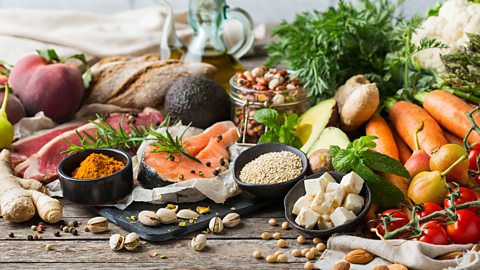What is the Mediterranean diet?
It can sometimes feel as though the concept of a βhealthy dietβ is shifting beneath our feet. What are good fats and bad fats? Should I avoid eating too many carbs? How much protein should I be eating?
You may well have come across the Mediterranean diet as a model of a healthy diet, but what is it exactly? The Mediterranean diet is a set of loose principles that represent the traditional diet and lifestyle of those who live around the Mediterranean, in the countries of Greece, France and Italy, for example.

This diet typically includes plenty of fruits, vegetables, legumes and pulses, as well as nuts, whole grains, fish, unsaturated fats such as olive oil. It also includes a moderate amount of dairy (cheese and yoghurt mostly) and limited consumption of meat and saturated fat, such as butter.
The Mediterranean diet was initially created as a concept by scientists studying the health of people living in southern Europe and whether their diet was an important factor. Over years of study, with mutiple populations in different Mediterranean countries, they noticed that people who conformed more to this traditional diet displayed:
- and
The NHSβs own is guided by many of the principles of the Mediterranean diet. However, the shows that people in the UK tend to fit a diet pattern called the Western diet, with high consumption of red meat, processed food, sugar and saturated fats, and limited amounts of fruit and vegetables. The Western diet is associated with poorer health.
So, how can you make your diet more Mediterranean?
Fruits, vegetables and carbs
Whole fruits and vegetables form the backbone of any healthy diet. The Mediterranean diet involves eating a wide variety of seasonal, fresh fruit and veg β although this can be frozen, tinned or dried. Ideally, fruits and vegetables should be minimally processed whole foods. The NHS Eatwell guide recommends that fruit and vegetables should make up about one third of your diet, which is a solid starting point. Five different fruit and veg each day is a realistic goal, but more is no bad thing. In Mediterranean countries, fruit is often eaten as dessert instead of a sugary treat β one habit worth adopting.
Potatoes are also part of the Mediterranean diet, which may surprise some. Potatoes get a bad reputation, as they are not included in our five-a-day and are often fried or processed. But the Mediterranean diet includes about 3-4 portions per week. Eating potatoes with their skins on is a better way to get the fibre and nutrients in potatoes.
Carbohydrates, demonised by some, are a big component of the Med diet. In Italy, for example, pasta, bread and rice make up a significant part of the daily diet. Donβt be afraid to base your meals around a starchy carbohydrate, but go for a wide variety of whole grains where possible as they contain more fibre and theyβre better for your heart and digestive health. If you find you eat the same carbohydrate for most meals (bread, for instance), try to invest in breads made with different grains such as rye, barley, millet or oats.
Why potatoes are better for you than you think
Fats in the Mediterranean diet
Healthy fats are another vital part of the Mediterranean diet. Low-fat diets have become popular in recent years, but the Mediterranean diet takes a different approach, promoting plant-based fats such as olive oil. Olive oil is the only single food, rather than broad group, that is a key identifier of the Mediterranean diet. Extra virgin olive oil is the most popular and though research in this area is still limited.
No one has advised a minimum amount of olive oil to have per day. One study looking at olive oil's effect on heart disease suggested participants consume , which would account for 80% of the . Including at least 2 portions of fish per week, especially oily fish like sardines, anchovies and mackerel would also contribute healthy omega-3 fats, as would the nuts and seeds that are eaten regularly.
Protein in the Mediterranean diet
The most prominent source of animal protein is fish, rather than meat. White fish is particularly low in calories while being a good source of protein, and oily fish as previously mentioned is also an important source of healthy omega-3 fatty acids. Poultry and eggs are also eaten a few times a week, though perhaps less often than fish.
Dairy products such as yoghurt and cheese are also eaten regularly in moderate portions. But moderate portions can be hard to define and the range of cheeses and yoghurts are vast. The debate continues on whether the saturated fat in dairy is harmful or helpful. The recommends choosing low-fat and unsweetened dairy products, and sticking to a 30g portion of cheese per day.
Legumes and pulses also make up a big part of the diet and theyβre an important source of protein alongside fish. Mediterranean countries are big consumers of beans, chickpeas and lentils. Not only are these nutritional powerhouses, theyβre also really cheap and widely available, and very versatile to cook with!
What foods are limited?
Red meat is high in saturated fats and so, though not completely avoided, tends to be consumed in limited quantities. You can make your diet more Mediterranean by swapping red meat for leaner protein sources such as white fish, as well as pulses and beans.
Alcohol is a defining feature of the Mediterranean diet, although it is specific about the quantity and type: 1-2 glasses of red wine, with meals, per day. While this low level of alcohol consumption is linked with , drinking alcohol moderately can . It is worth pointing out that any benefits found to heart health from this low level of red wine consumption are lost when we drink more.
Ultra-processed food, industrially-produced foods with multiple additives, are consumed in the Western diet in the form of snacks, ready-meals, processed meats, sweets, soft drinks and breakfast cereals. These do not have a place in the Mediterranean diet, though the World Health organisation is reporting that are eating these foods as they adopt a Western diet.
It also pays to avoid added sugars where possible. There is no strict rule on this but a Mediterranean diet tends to avoid sweets and sugary foods where at all possible, instead swapping them for fresh and dried fruits.
The Mediterranean lifestyle
At the foundation of the Mediterranean diet is a whole lifestyle, including time for regular exercise, relaxation and socialising. Try to get outside for a good walk a few times a week, and take some time to enjoy your meals and eat with friends and family. Finding recipes you enjoy cooking and sharing can be one way to wind down.
While research continues as to the specific ways the Med diet benefits health, it is the overall pattern of eating and lifestyle that seems to be more important than any single food. The general principle of eating a wide variety of fresh, whole foods allows for specific tastes, seasonal availability and ethical choices to be accommodated.
Research is ongoing to apply the same diet principles to countries with different cultural and dietary heritage. Some diets, like the traditional Japanese diet or the New Nordic diet, map well to the principles of the Mediterranean diet, even while containing very different individual foods.
If you can follow these guidelines, not only will you eat healthy, youβll also eat well!
